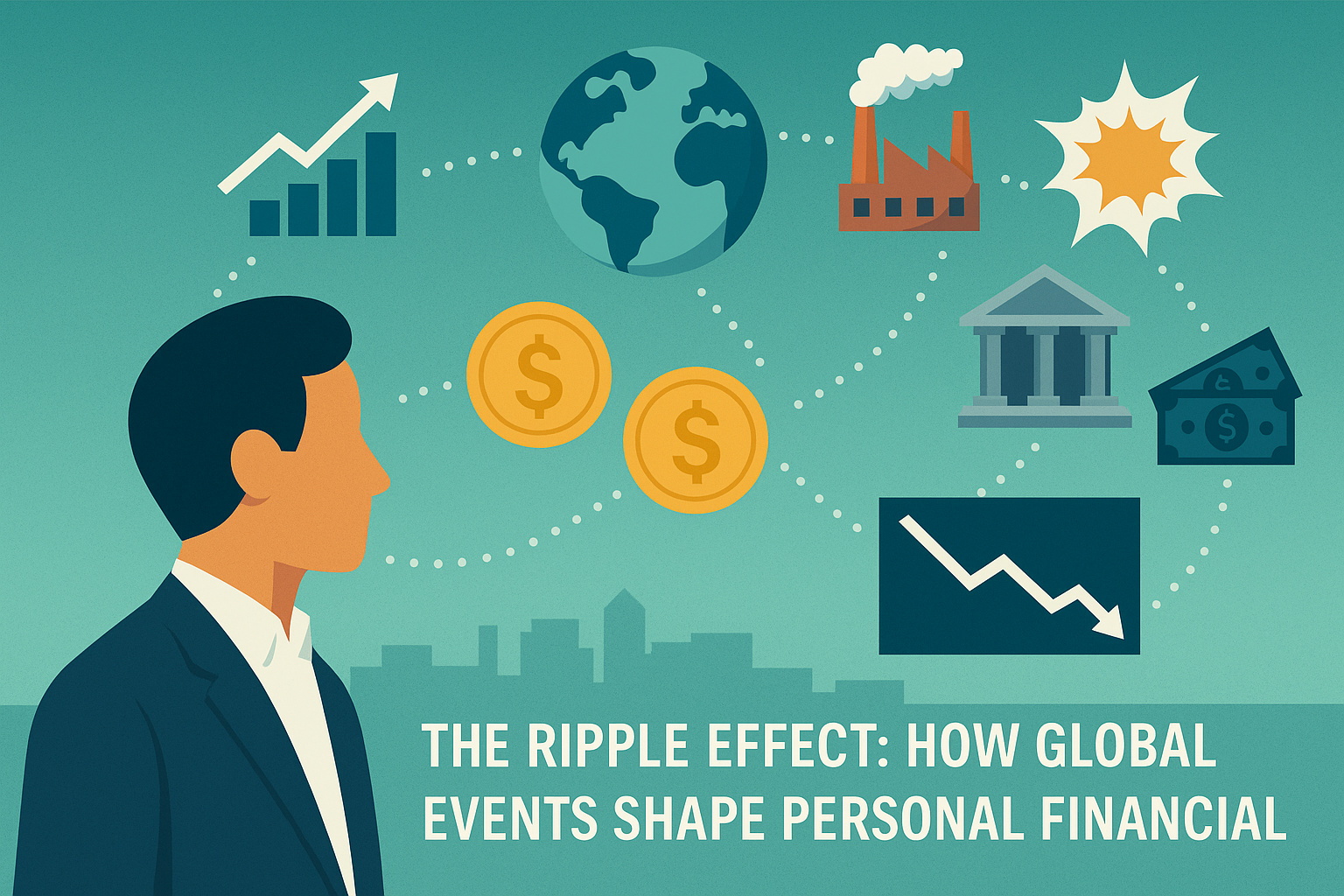In today’s interconnected world, global events can influence your personal financial decisions more than ever before. Whether it’s a pandemic, geopolitical conflict, trade disruption, or climate crisis, the ripple effect of global occurrences often reaches your wallet faster than you might expect.
How Global Events Influences Personal Finances
Global events don’t happen in isolation. They create ripple effects across economies, markets, job sectors, and personal incomes. Recognizing these links can help you make smarter financial choices when the unexpected strikes. Here’s how global events typically impact personal finances.
Market Volatility: Stock markets are highly sensitive to global news. Political instability, trade wars, pandemics, and technological disruptions can trigger massive market swings within hours.
During the COVID-19 pandemic in early 2020, global stock markets plunged, wiping trillions of dollars in value. Volatility is natural; planning ahead reduces emotional decision-making.
Inflation and Rising Costs: Global supply chain disruptions, energy crises, and commodity shortages lead to higher prices for everyday goods, from groceries to gasoline. Inflation erodes purchasing power, meaning your money buys less over time. The 2022 global energy crisis caused by geopolitical tensions pushed fuel and food prices upward worldwide.
Employment and Career Risks: Major global events can disrupt industries and shift labor demand. A pandemic may cripple the tourism sector, while a technological boom may create new roles in cybersecurity or renewable energy. Remote work surged during the COVID-19 pandemic, changing the way millions of people approach their careers and earnings.
Currency Fluctuations: Global economic instability often leads to fluctuations in currency values. This affects travelers, online shoppers, investors, and businesses with international exposure. Economic sanctions or monetary policies can cause sharp devaluation of a currency, making imported goods more expensive for consumers.
Investment Opportunities: Not all ripple effects are negative. Global disruptions often create opportunities for strategic investments in emerging markets, innovative sectors, or undervalued assets. During the early stages of the COVID-19 crisis, industries like e-commerce, health technology, and remote work solutions (Zoom, Amazon, etc.) flourished.
Global Events Affect Financial Behavior
Understanding how these events shape financial behavior is crucial for protecting your wealth, building resilience, and seizing new opportunities. In this article, we’ll explore the impact of global events on personal finance and strategies you can use to adapt and thrive during uncertain times. Let’s dive deeper into specific types of global events and their distinct financial impacts:
| Pandemics and Health Crises | Geopolitical Conflicts |
| Increased healthcare spendingChanges in consumer behavior (more online shopping)Surge in remote work technologiesGreater emphasis on building emergency savings | Rising commodity prices (oil, wheat, metals)Flight to safe-haven assets (gold, bonds)Stock market volatilityDisruption in trade routes |
| Economic Recessions | Natural Disasters and Climate Change |
| Rising unemploymentBusiness closuresDeclines in asset values (stocks, real estate) | Insurance premiums increaseSupply chain disruptionsInvestments in green technologies rise |
Is necessary to build strategy to deal with all the events, such as maintain a healthy emergency fund covering 6–12 months of expenses. Invest in health insurance and consider telehealth services. Also, Review and diversify investments geographically. Avoid panic-selling during market downturns triggered by global tensions.
Another strategy is minimizing high-interest debt, boosting your savings rate during prosperous times, and seeking recession-resilient investments (consumer staples, healthcare). Ensure you have appropriate insurance coverage. Explore opportunities in sustainability-focused investments.
Protect your Finances in a Globalized World
Building financial resilience against the ripple effects of global events requires proactive planning. Here’s how:
Build a Strong Financial Foundation: Before worrying about complex investments or currency strategies, focus on basics:
- Pay off high-interest debts
- Establish an emergency fund
- Live below your means
Diversify Your Assets: Avoid putting all your eggs in one basket. Invest across:
- Different asset classes (stocks, bonds, real estate)
- Geographical regions (domestic and international)
- Sectors (technology, healthcare, consumer goods)
Diversification helps smooth returns and protect against localized risks.
Stay Informed but Avoid Panic: Follow reliable sources for global news and financial analysis. However, avoid making knee-jerk financial decisions based on sensational headlines. Key Sources to Watch:
- Bloomberg
- Financial Times
- World Economic Forum
- IMF Reports
Focus on Skills and Career Flexibility: Your career is one of your most valuable financial assets. Global events can disrupt industries overnight. Invest in:
- Digital skills
- Financial literacy
- Language skills (for international markets)
- Certifications relevant to global trends (cybersecurity, sustainability, logistics)
Adaptability increases job security and income opportunities.
Review and Adjust Regularly: Life and the world economy change fast. Conduct a financial review every six months to ensure your strategies still align with the global environment. Checklist for Financial Review:
- Budget and spending
- Investment portfolio allocation
- Insurance coverage
- Emergency fund status
- Career growth plans
Finally think Global Act Local
The ripple effects of global events on personal finances are undeniable—and growing. From fluctuating grocery prices to dramatic stock market swings, your money feels the impact of events happening continents away.
Rather than fearing globalization and unpredictability, embrace them with preparation and knowledge. By building financial resilience, staying adaptable, and keeping a global perspective, you transform potential threats into opportunities for growth.
In the end, your best defense against global uncertainty is a solid offense: smart saving, diversified investing, career flexibility, and continuous learning. Stay alert, stay agile, and your finances will be stronger for it.


In today’s world, global events have a significant influence on our daily financial decisions. Understanding these impacts can help us navigate through uncertainties and protect our wealth. Recognizing the connections between global occurrences and personal finances is essential for making informed choices. By staying informed, we can better prepare for unexpected changes and identify opportunities.How can we effectively build financial resilience in the face of global disruptions to ensure long-term stability?